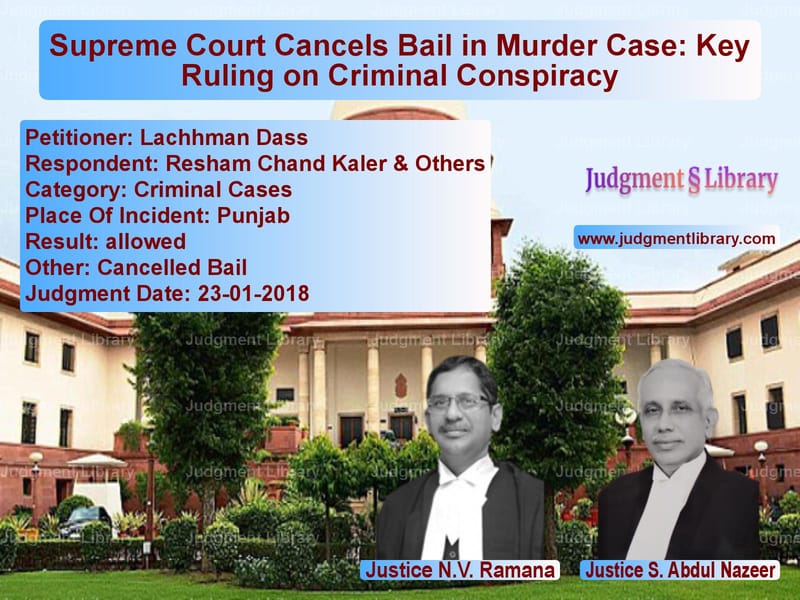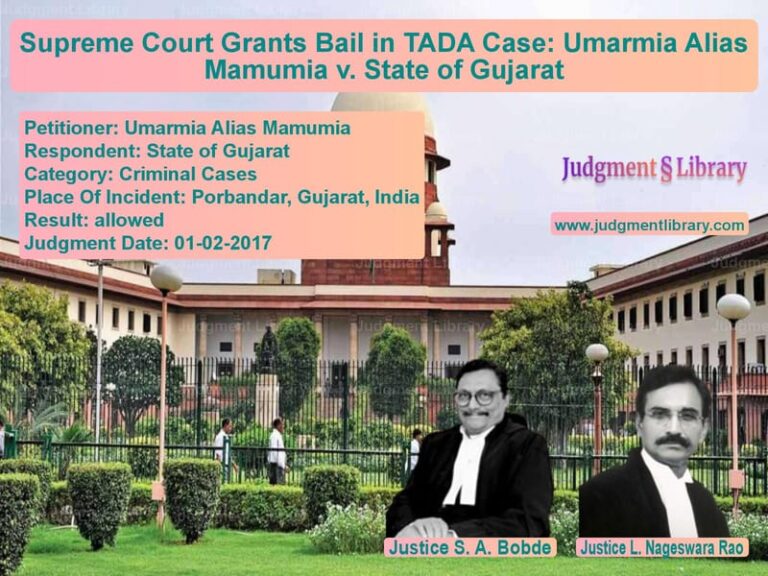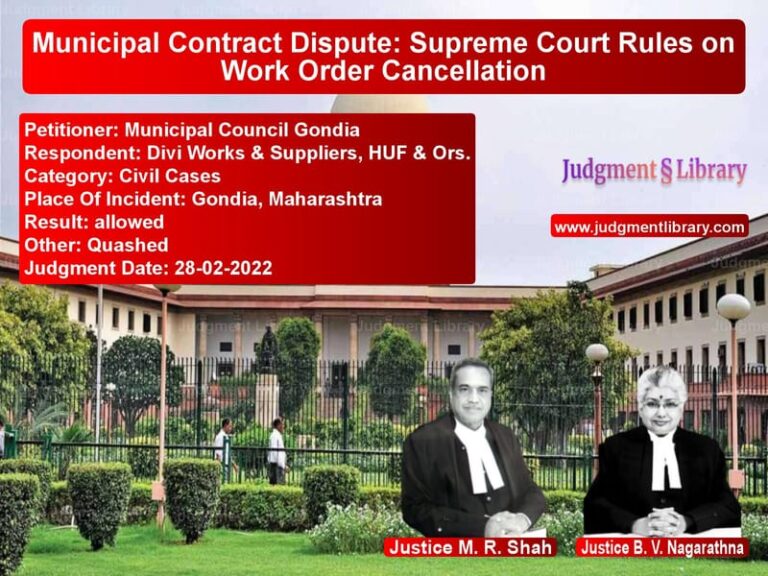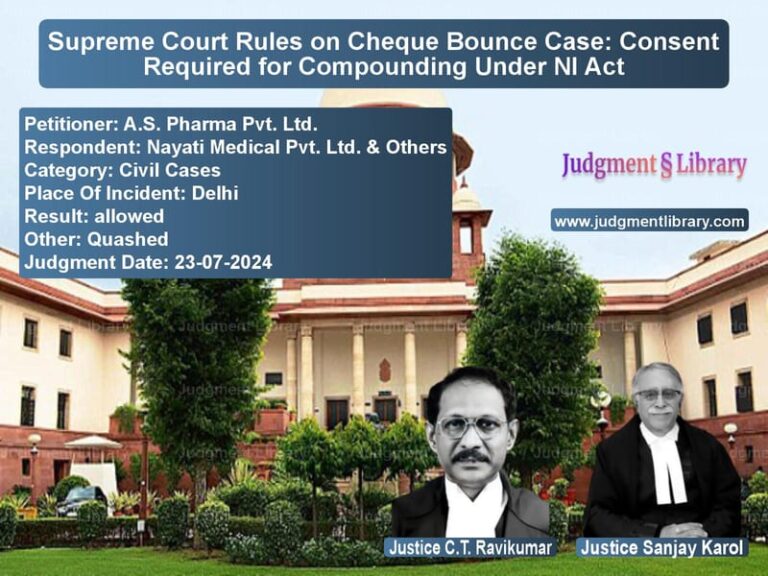Supreme Court Cancels Bail in Murder Case: Key Ruling on Criminal Conspiracy
The Supreme Court of India, in the case of Lachhman Dass vs. Resham Chand Kaler & Others, addressed a crucial legal issue concerning the grant of bail in a serious criminal case involving murder, criminal conspiracy, and illegal possession of arms. The ruling reaffirmed the principles governing bail in cases of grave offenses and emphasized the need for courts to exercise caution in granting bail to accused individuals involved in criminal conspiracies.
Background of the Case
The case arose from an FIR registered on 05.11.2015 under Sections 302 (murder), 307 (attempt to murder), 324 (voluntarily causing hurt), 148, and 149 of the Indian Penal Code (IPC) along with Sections 25, 27, 54, and 59 of the Arms Act, 1959. The allegations pertained to a violent altercation in which Shingar Chand was shot dead, and other individuals suffered grievous injuries. The accused, Resham Chand Kaler (an NRI), along with Kulbir Singh and others, allegedly participated in the crime as part of a premeditated conspiracy.
Key developments in the case:
- The trial court rejected the bail plea of the main accused on 14.09.2016, citing the gravity of the offense.
- The accused then approached the Punjab and Haryana High Court, which granted bail on 19.01.2017.
- The complainant, Lachhman Dass, challenged the High Court’s decision in the Supreme Court.
Key Legal Issues
- Did the High Court err in granting bail despite the seriousness of the offense?
- Was the accused involved in a criminal conspiracy as alleged in the FIR?
- Did the High Court properly consider the prosecution’s evidence before granting bail?
- What legal principles govern the grant of bail in cases involving murder and conspiracy?
Arguments by the Petitioner (Lachhman Dass)
The petitioner argued:
- The High Court granted bail without adequately considering the evidence against the accused.
- The accused was a key conspirator and had actively participated in the planning and execution of the crime.
- Co-accused Kulbir Singh was a known criminal involved in multiple murder cases, and his association with the accused indicated a premeditated conspiracy.
- Granting bail in such a serious case could allow the accused to tamper with evidence and intimidate witnesses.
Arguments by the Respondents (Resham Chand Kaler & Others)
The defense contended:
- The case was a result of a property dispute and not a planned conspiracy.
- The accused had no direct involvement in the shooting and was present at the scene only as a bystander.
- The High Court had correctly applied bail jurisprudence, considering that the trial was likely to take a long time.
- The accused was an NRI and had no prior criminal record, warranting a lenient approach.
Supreme Court’s Observations
The Supreme Court critically examined the material evidence and past precedents on bail jurisprudence. The Court observed:
- “The accused was actively involved in the conspiracy and was present at the scene when the murder took place.”
- “The High Court overlooked crucial facts indicating the accused’s role in planning and executing the crime.”
- “Granting bail in a case of such gravity without a detailed examination of the prosecution’s evidence was inappropriate.”
- “Given the nature of the offense and the accused’s alleged role, custodial interrogation was necessary.”
Supreme Court’s Judgment
The Supreme Court set aside the High Court’s order granting bail and directed the immediate custody of the accused. The key aspects of the ruling included:
- The accused’s role in the criminal conspiracy was substantial, warranting continued detention.
- The High Court failed to consider the gravity of the offense and the likelihood of evidence tampering.
- The bail conditions set by the High Court were insufficient to prevent interference in the trial.
- The accused must be taken into custody immediately to ensure a fair trial.
Key Legal Precedents Considered
The Supreme Court referred to several landmark judgments on bail and criminal conspiracy, including:
- State through CBI vs. Amarmani Tripathi (2005): Emphasized that bail should not be granted when there is a prima facie case of conspiracy in serious offenses.
- Prakash Kadam vs. Ramprasad Vishwanath Gupta (2011): Addressed the need for stringent bail considerations in cases involving professional criminals.
- Madan Mohan vs. State of Rajasthan (2017): Stressed that High Courts should not issue mandatory directions that undermine trial court discretion.
Implications of the Judgment
This ruling has significant implications for criminal law and bail jurisprudence:
- Strengthens judicial scrutiny in granting bail for serious offenses.
- Emphasizes the role of conspiracy in determining bail eligibility.
- Ensures that bail does not become a tool to evade legal accountability.
- Upholds the principle that evidence tampering risks must be weighed before granting bail.
Conclusion
The Supreme Court’s decision in Lachhman Dass vs. Resham Chand Kaler & Others sets a precedent for handling bail applications in cases involving murder and criminal conspiracy. The ruling reinforces the need for judicial caution in granting bail for serious crimes, ensuring that justice is not compromised. By canceling the bail and ordering the accused’s immediate custody, the Court has upheld the integrity of the criminal justice system and reinforced the principles governing bail jurisprudence.
Don’t miss out on the full details! Download the complete judgment in PDF format below and gain valuable insights instantly!
Download Judgment: Lachhman Dass vs Resham Chand Kaler & Supreme Court of India Judgment Dated 23-01-2018.pdf
Direct Downlaod Judgment: Direct downlaod this Judgment
See all petitions in Bail and Anticipatory Bail
See all petitions in Attempt to Murder Cases
See all petitions in Fraud and Forgery
See all petitions in Judgment by N.V. Ramana
See all petitions in Judgment by S. Abdul Nazeer
See all petitions in allowed
See all petitions in Cancelled Bail
See all petitions in supreme court of India judgments January 2018
See all petitions in 2018 judgments
See all posts in Criminal Cases Category
See all allowed petitions in Criminal Cases Category
See all Dismissed petitions in Criminal Cases Category
See all partially allowed petitions in Criminal Cases Category







